
Featured Blog | This community-written post highlights the best of what the game industry has to offer. Read more like it on the Game Developer Blogs.
Did I Make My Game Myself (and does it matter)?
As someone claiming to be a solo-dev, I thought I'd delve into why (or if) this title matters, and then break down my own game, Carceri, as a solo-dev case study.

There's talk lately about the authenticity of certain developers claiming to be a "solo dev," as in, a person developing a game by themselves. Some say that if they've received ANY help whatsoever, then they must revoke their self-proclaimed solo title, and return to their Hobbit-hole, never to be seen or spoken of again.
As someone claiming to be a solo-dev, I thought I'd delve into why (or if) this title matters, and then break down my own game, Carceri, as a solo-dev case study. You can judge for yourself if I'm "legit," or if I should prepare for my return trip to the Shire.
Lower the Stakes
What does an authentic "solo" distinction gain a developer? One could argue it depends on WHEN the claim is being made.

Back in the Atari days, many games were designed and programed by one person; this was the norm. But even by the NES days, solo games were a rarity, and by the days of disk-based consoles the idea of a solo developer was completely dead. So, when indie games returned to the scene, the claim that "a single guy/gal made this game in their garage," was a total novelty.
But...indie games "returned" over a decade ago. Indie Game: The Movie came out in 2012, documenting an already existent, albeit small, indie scene. Everything about indie games is now a regular part of the overall game industry, and they’ve flooded the market. Which means, to proclaim you're a solo-dev these days is about as novel as using a "retro pixel-art" style, or making a roguelike. That is to say, it's business as usual.

Surely, there's more to this claim than just novelty though? After all, it's STILL super impressive that one person can whip up something as complex as Manor Lords or Europa by themselves, games that dwarf my own. And that, I think, is the biggest benefit of claiming to be a solo-dev: setting expectations.
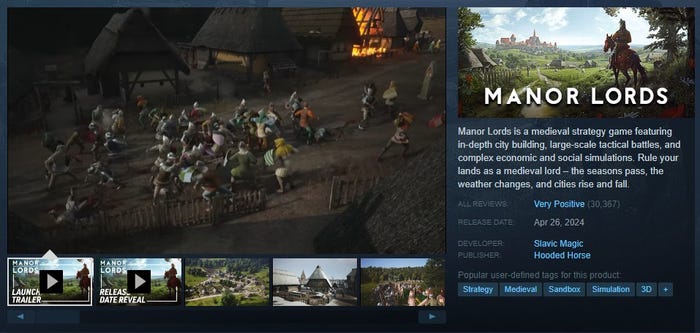
Suppose we were told that Manor Lords was a first-party Microsoft game, made by a team equal to that of Halo. Hundreds of devs, infinite budget, no deadlines, etc. Players would expect everything to be perfect: bleeding edge graphics, no bugs, instant fixes, and so on. It might even get review bombed for missing a feature the community expects to be there.
Knowing, however, that Manor Lords is made by one person, the perspective shifts from, "is that it?" to "they did all THIS?" The fact that the game looks good, plays well, and has lots of features is seen as miraculous. It's far more impressive than anyone expects from a single developer, to the point that some of its minor faults are even forgiven by players, which is a rarity.
On that subject, players have asked Manor Lords solo-dev, Greg Styczeń, to hire some people to help fix the game faster. Seems that as you move from "solo dev" to "small dev team" you also move into a different bracket of expectations. A team is a group, and you can add more people to a group to fix any problems (from the public's perspective. As Styczeń and other developers know, throwing bodies at a problem usually isn't the best solution).
What does this all mean? That being a solo-dev these days bestows slight novelty value to your game, and a small degree of goodwill from players. Friends and family of a solo-dev are, naturally, extremely impressed by your efforts. However, players, who don't know or care about you, ultimately still want something that is interesting, and worth their time. Players don't search the "solo-dev" tag, on Steam, when they're hungry for new games. Look again at that Manor Lords picture above, there’s no mention of solo-dev in the main marketing capsule; it’s just not that important.
To boil it all down: being a "real" solo-dev doesn't much matter these days, one way or another.
Barely Standing on the Shoulders of Giants
Now that we know this topic isn't important, let's keep talking about it!
As I mentioned above, I'm the self-proclaimed solo-dev of Carceri, a small (but hopefully interesting) game about all the prisons we throw ourselves in, and the various ways we try to escape them. Carceri is a first-person open-ish world exploration game made in Unreal 4, in which, I claim, I "made everything:" 3D art, writing, music, level design, scripting, and key art. Potentially neat, if true, but am I just blowing smoke? Let's break this down!
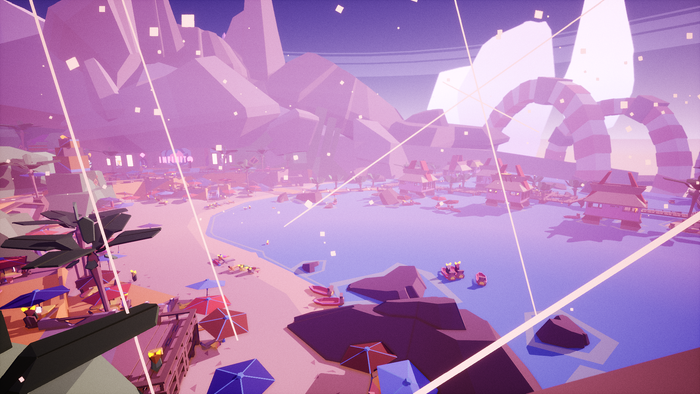
Get with the Programs
The most obvious place to start is with something I just said: Unreal 4. The Unreal Engine has been worked on by hundreds (thousands?) of devs since the 90s! There is NO WAY, in this world, or the multiverse, that Carceri exists without the Unreal Engine. And naturally, many other programs were involved as well: Blender, Ableton, Affinity Photo/Designer, GoldWave, and the list goes on.

That's not to mention the primary means of distributing Carceri to the world: Steam. For my previous game, ULTRAWORLD EXODUS, I began by selling the game directly through my old website, which was a royal pain (also, that website's design/hosting were thanks to programs too). All of this is to say that I couldn't have made any of the tools/infrastructure-related parts of Carceri by myself. No tools, no game.
Some Things are for Sale
Missing from my laundry list of creation claims above is sound effects. All the non-music audio in Carceri has been purchased from a variety of sources: the Unreal Marketplace, asoundeffect, and the biggest one by far, Amazon Polly (the characters in Carceri are all programs, living right now in a digital world that co-exists with our own. Fictionally, THEY are the ones using Amazon Polly to generate a voice for themselves, not me). Maybe some of the SFX I could have made myself (poorly), but I certainly couldn't generate the voices, nor did I have the funds to hire human actors, (who fictionally wouldn't make sense anyhow).
But that's comparatively small potatoes in light of the Unreal plugins I purchased to help construct the game. The entire menu/save system! The post-processing backbone of my Art-toy camera system! Even smaller things, like a better way to get objects to rotate/scale in real-time. Having built my previous game with no plugins, I knew there were certain pain-points of development that would either a) make me quit building the game or b) add months of misery. So, for $10 here, $40 there, I could skip the worst of these soul-crushing lulls.
One thing I didn’t do for Carceri is hire/contract other people, mostly because that’s expensive! But what if did? What if, instead of buying a SFX pack, I outsourced that work to a professional sound designer. Say I paid them a flat fee to make the sounds I needed, and also said “hey, feel free to release this as a sound pack for others to buy!” How is that situation different than me buying a sound pack, just with an alternate set of steps to get the same results?
That said, at some point this logic breaks down. Imagine if I were independently wealthy (as I do all the time), and I decided that the pain-points of development were…all points. And so, after designing my dream game, I paid contractors to build every single part. In this case, am I even a developer anymore, or just a publisher? Somewhere along this spectrum of getting outside help we must relinquish our solo-dev title, though where that line is drawn is subjective, and, as we’ve already pointed out, being a bona fide solo-dev isn’t all that important anyhow.
Some Things are Free
I'm an amateur Art history nerd, and I see videogames as part of that history. As such, there are several galleries in Carceri that feature real-world Art. These paintings were taken from the Open-Source collections of The Met, The Cleveland Museum of Art, the LACMA, the National Gallery of Art, and the Yale University Art Gallery. Certainly, works I couldn't produce by myself, otherwise I'd be the greatest Artist in history!

Since Carceri deals with the lives of programs today, it was unavoidable to address the elephant in the room: generative AI Art. After all, this IS the Art that programs produce right now, so it's absence would be fictionally bizarre. As such, there are a handful of generated images in Carceri (all clearly marked). I mostly used prompts that reference Art History: old masters, Delacroix, Hudson Valley School, etc. Even still, who knows where these AI models took their imagery from? So, I went ahead and photo-collaged many of the results together, creating images altered beyond their raw generative output. All that said, unlike prompters, I don't think of AI art as something I created.
Some Things are Priceless
Carceri contains a lot of dime-store philosophy. Much of it is delivered with jokes, or by cutesy characters, but even so, it’s plentiful. As with the real-world Art of the galleries, Carceri addresses real-world philosophies, with ideas taken from the last 2000+ years of western thought. Certainly, CERTAINLY, I didn't come up with this stuff by myself. While I'd like to think Carceri provides a unique spin on these subjects, and maybe, eventually, pushes into new territory, it is absolutely standing on the shoulders of titans.
Could I have generated a wholly new system of thought for a $7 indie game most will ignore? Probably not, but even if I could, why would I do that?
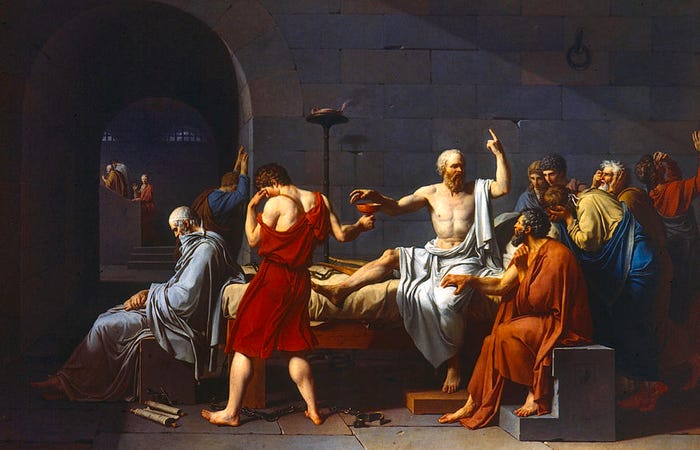
Power of the People
And let's be honest, there are always other people involved, no matter what. Everyone (who's serious about game development) has people playtest their game. Carceri would be a mess if a few people didn't sit and get hopelessly lost in my questionably designed early levels. And if the world ever hears about Carceri, it certainly wasn't from me, a social media recluse. They heard about it from some form of influencer: game website, youtuber, streamer, and so on. Without these message amplifiers, the game might as well not exist, and then who cares how many people developed this lost work of Art?
And, of course, there's the people we thank if we ever win an award: parents, family, friends, teachers, and colleagues. People who supported us, pushed us, and didn't make us become lawyers.
The Author is Dead. Except When They Aren't.
Roger Ebert said videogames are never, and will never, be Art because they can’t be works of true authorial intent, since players are free to do whatever they please. Of course, designers know that the choices given to players are PART of the authorial process, as we decide which actions are/aren’t available to them, and what those actions mean to the game’s narrative.
That aside, perhaps when we talk of solo-devs, we're talking about this fabled Author? After all, to the claims that Manor Lords wasn't a solo-dev game, Styczeń responded saying something to the effect of "fire me and the game dies. I am the game." And he's right. It was his vision, his design, his hard work that made it into the smash success it is today. Yes, they could fire him (not sure who "they" are), and simply maintain what's already there, but anything added after his departure would clearly be the work of a new author.
Think of how Star Wars has drifted since Lucas stepped away. Or, to bring it back to videogames, think of how stagnant Metal Gear has become since Hideo Kojima was rudely ejected. Even before Konami's intervention, Kojima kept trying to retire from Metal Gear, claiming each was his last. Yet he always returned, conceding that other directors simply didn't understand. And how could they? Metal Gear is Kojima's wild story to tell, much like Star Wars is Lucas's. Metal Gear Survive basically had no story, and now the Snake Eater remake is using the exact words of it's original; neither game daring to be the next chapter of what should, from a business perspective, be something you'd think Konami would milk to death. Guess they’re stranded.
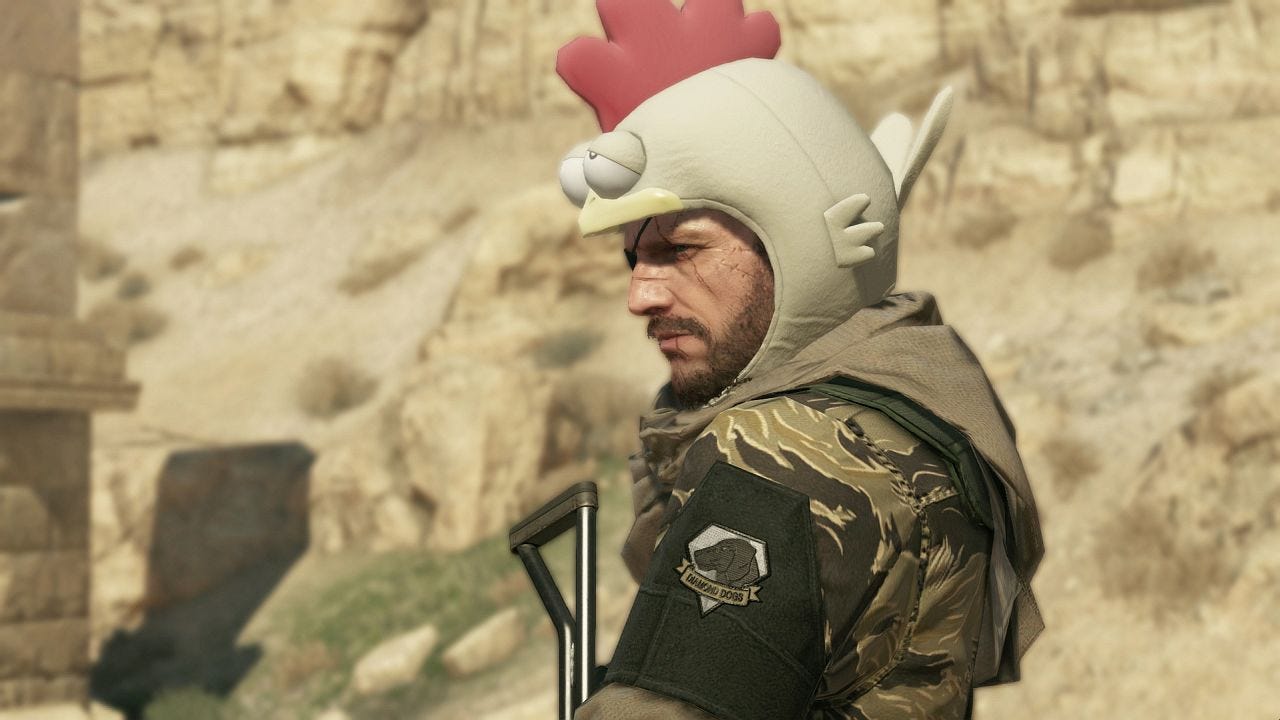
But now we've run into a curious problem: neither Star Wars, nor Metal Gear, were solo endeavors. Both were made with HUGE teams. Of course, Ebert recognized Star Wars as a work of art and authorship, but not Metal Gear (because, y’know, chicken hats in cutscenes, undermining the author; as if that option found its way into the game by accident). Maybe one of the benefits of claiming to be a solo-dev is to insinuate that your game is, by default, a work of authorship. Granted the author might suck (hi), but, in a way, "solo-dev" is making a promise to players that this game/work of Art hasn't been diluted, or compromised. For better or worse, it's the result of a single vision.
That said, authorship doesn't have to come from a sole person, which is why most games are rightly attributed to an entire team. Ultimately, whether authorship matters or not, for games, is a separate debate (though one would assume an "authorless" game to be a hollow shell with no identity). For now, this sole author talk is simply my way of feeling a bit justified for all my dev effort when I probably should have just become a lawyer. Or asked someone for help.
[CarceriShot03 picture here]
So...
...did I make my game myself? Yes, in that I did all the author-related labor. No, in that it's merely the product of the times/culture I live in, one using the freely available technology/imagery/ideas of the day, just as it has been with all Art throughout history. But I did buy some stuff, so I guess I’ll leave it for you to decide. I'll return to my hobbit-hole now.
-
Carceri, (named after the etchings of Piranesi), came out in May 2024 to no notice, and became lost Art, as prophesized. It was created by solo-dev James Beech, who also worked on Metroid Prime 4, Remnant: From the Ashes, and Crysis 3.
Read more about:
Featured BlogsAbout the Author(s)
You May Also Like


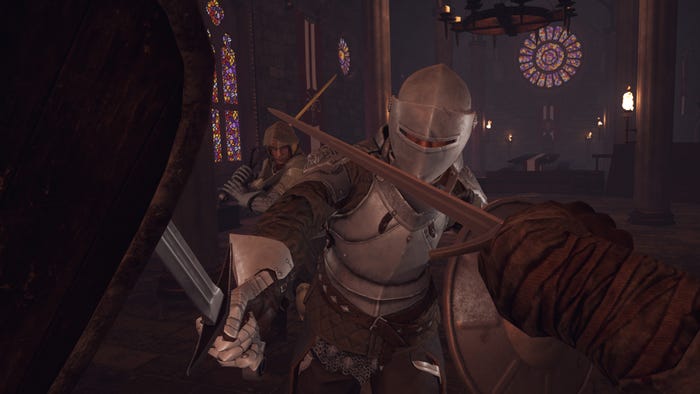
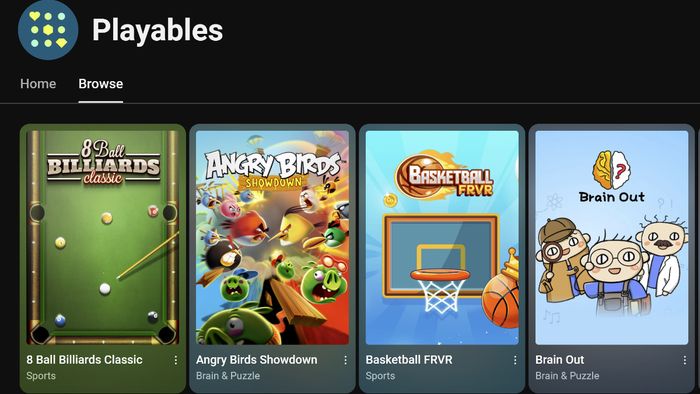





.png?width=300&auto=webp&quality=80&disable=upscale)



